FOB:

FOB Means “Free on Board”.
The seller must load the goods on board the vessel nominated by the buyer. Cost and risk are divided when the goods are actually on board of the vessel. The seller must clear the goods for export into board. Seller passes all risk when goods ship on board. If goods damage in waterways it will responsible agent or buyer.
EXW:
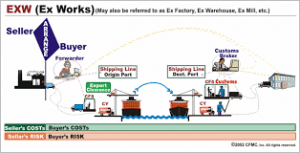
EXW means “Ex Works” (named place of delivery).
The buyer is responsible for loading the goods onto a vehicle for all export procedures; for onward transport and for all costs arising after collection of the goods.
The seller sells the goods available at his premises. The buyer is responsible for uploading the goods as per agreed. This term places the maximum responsibility on the buyer and minimum responsibilities on the seller. The Ex Works term is often used when making an initial quotation for the sale of goods without any costs included. EXW means that a seller has the goods ready for collection at his premises (factory, warehouse, plant) on the date agreed upon. The buyer pays all transportation costs and also bears the risks for bringing the goods to their final destination. The seller does not load the goods on collecting vehicles and doesn’t clear them for export. So, buyer has all the responsibilities collection the goods from factory or warehouse.
FCA:

FCA means “Free Carrier”.
The free carrier mean’s that seller delivers the goods to carrier. So, seller clears the goods for export where applicable.
The seller delivers goods, cleared for export, to the buyer-designated carrier at a named location. This is used for any mode of transport. The seller must load goods onto the buyer’s carrier. The key document signifying transfer of responsibility is receipt by carrier to exporter.
CPT:
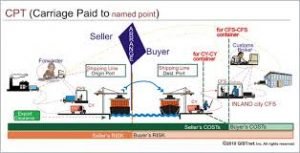
CPT means “Carriage Paid To”.
CPT means paid to & it followed by name of destination. The seller must pay the freight carriage the goods a name of destination.The risk & damage will be bear buyer when the goods deliver to the place name of designation.
CIP:
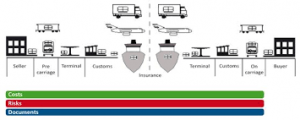
CIP mean that Carriage and Insurance Paid to (named place of destination)
The seller has to process marine insurance against the buyer’s risk of loss of or damage to the goods covering that period until the goods have been delivered from the carrier to the buyer.
DAT:
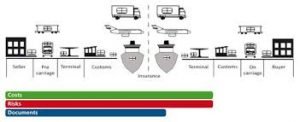
DAT means – Delivered at Terminal (named terminal at port or place of destination)
Seller delivers the goods once unloaded from the arriving means of transport, are placed at the disposal of the buyer at a named terminal at the named port or place of destination. “Terminal” includes any place, like as, warehouse, container yard or road, rail or air cargo terminal. The seller bears all risks involved in bringing the goods to and unloading them at the terminal at the named port or place of destination.
DAP:

DAP means Delivered at Place (named place of destination).
This term means that the seller pays all the costs of transportation (export fees, carriage, insurance, and destination port charges) up to and including the delivery of the goods to the final destination. The buyer is responsible to pay only the import duty/taxes/customs costs. The buyer also is responsible to unload the goods from the vehicle at the final destination.
DDP:

DDP means – Delivered Duty Paid (named place of destination).
This term means that the seller assumes all the risks and costs of transport (export fees, carriage, insurance, and destination port charges, delivery to the final destination) and pays any import customs/duty. The buyer has only to unload the goods at the final destination.
FAS:

FAS means – Free alongside Ship (named port of shipment).
The goods are placed alongside the ship at the named of port. It will be considered finish the goods delivery. The seller must clear the goods for export. It term used only sea shipment not air mode.
CFR:
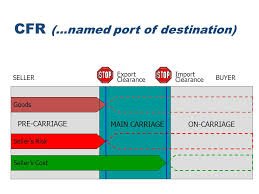
CFR means – Cost and Freight (named port of destination)
The seller covers all the costs of bringing goods from their origin to the port of destination, including carriage costs and clearing the goods for export except for the insurance.The seller takes care of the actual loading and transportation of goods up to the port of destination, the buyer pays the insurance.
CIF:
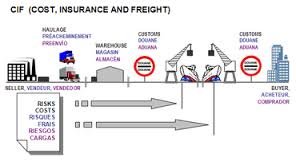
CIF Means –”Cost, Insurance and Freight” (named port of destination).
Cost, Insurance and Freight” means that the seller has the same obligations as under CFR but with the addition that he has to procure marine insurance against the buyer’s risk of loss of or damage to the goods during the carriage. The seller contracts for insurance and pays the insurance premium. The buyer should note that under the CIF term the seller is only required to obtain insurance on minimum coverage. The CIF term requires the seller to clear the goods for export.
Md.Mahbub-Ul Islam
RMG Consultant & Researcher
mahbub.islam54@gmail.com





